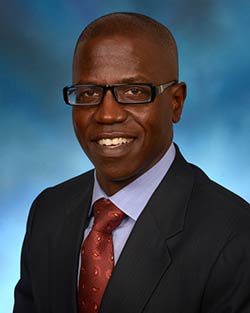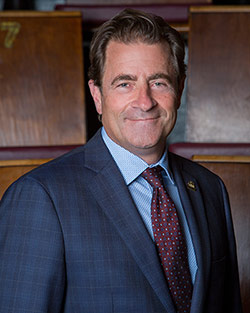February 22, 2023 | Heide Aungst

Ronna Hertzano, MD, PhD, Will Direct Newly Established Neurotology Branch Focusing on Neurological and Genetic Conditions that Lead to Hearing Loss
Ronna Hertzano, MD, PhD, Professor of Otorhinolaryngology-Head & Neck Surgery, at the University of Maryland School of Medicine (UMSOM) has been appointed as Chief of the newly established Neurotology Branch in The National Institute on Deafness and Other Communication Disorders (NIDCD).
The new branch at the National Institutes of Health (NIH) focuses on neurological and genetic conditions that cause hearing loss. Neurotology is the study of neurological issues within the ear, which can cause balance issues, some forms of deafness, and ringing in the ear (tinnitus). She begins her new position at NIDCD on February 13, 2023.
Dr. Hertzano continues as a Clinical Professor in UMSOM's Department of Otorhinolaryngology—Head & Neck Surgery, and as an affiliate faculty member at UMSOM’s Institute for Genome Sciences (IGS). She also plans to continue her surgical practice and clinical duties at the University of Maryland Medical Center (UMMC) on a part-time basis.
At NIDCD, Dr. Hertzano will oversee the Neurotology Branch’s intramural clinical trials to identify promising new therapeutic strategies including medicines, gene therapies, and surgical procedures. "Our molecular understanding of hearing loss has reached a new threshold, and now we are able to create interventions to treat hearing loss in a new way, beyond hearing aids or cochlear implants,” she said. “I am honored and thrilled to head a new branch position at NIDCD to encourage new translational research with the potential to yield exciting new advances in the field.”
Dr. Hertzano's research focuses on the molecular basis of age-related and noise-induced hearing loss. She studies genes involved in hair cell development in the ear and has found in mouse models certain genetic mutations that lead to the early degeneration of hair cells and subsequent hearing loss. She also developed an innovative genomic data portal for scientists to share and analyze gene expression data, called gEAR (gene Expression Analysis Resource).
Dr. Hertzano’s new position at NIDCD has generated overwhelming enthusiasm in her department and throughout the medical school.
 “Dr. Hertzano is an extraordinary clinician-scientist whose research has had an outsized impact on our understanding of the mechanisms of noise-induced hearing loss, and whose compassionate care of her patients is an inspiration,” said Claire Fraser, PhD, the Dean E. Albert Reece Endowed Professor, Director of IGS, and Professor of Medicine and Microbiology and Immunology at UMSOM, who originally served as one of Dr. Hertzano’s mentors.
“Dr. Hertzano is an extraordinary clinician-scientist whose research has had an outsized impact on our understanding of the mechanisms of noise-induced hearing loss, and whose compassionate care of her patients is an inspiration,” said Claire Fraser, PhD, the Dean E. Albert Reece Endowed Professor, Director of IGS, and Professor of Medicine and Microbiology and Immunology at UMSOM, who originally served as one of Dr. Hertzano’s mentors.
 “I am so proud of Dr. Hertzano’s new appointment and delighted that she will continue to be a core part of our mission here,” said Rodney J. Taylor MD, MSPH, the Bruce and Isobel Cleland Professor and Chair, Department of Otorhinolaryngology—Head & Neck Surgery at UMSOM. “She began her training with us during residency, and now, 17 years later, she has transformed herself into a visionary leader in the field with national and international recognition.”
“I am so proud of Dr. Hertzano’s new appointment and delighted that she will continue to be a core part of our mission here,” said Rodney J. Taylor MD, MSPH, the Bruce and Isobel Cleland Professor and Chair, Department of Otorhinolaryngology—Head & Neck Surgery at UMSOM. “She began her training with us during residency, and now, 17 years later, she has transformed herself into a visionary leader in the field with national and international recognition.”
Dr. Hertzano earned a Bachelor of Science from Tel Aviv University, Israel, and both her medical degree and a PhD in human molecular genetics and biochemistry from the Sackler School of Medicine, Tel Aviv University. She completed her residency in otorhinolaryngology-head and neck surgery at the University of Maryland School of Medicine in 2011. She became an assistant professor in the Department of Otorhinolaryngology—Head & Neck Surgery in 2012, joined IGS in 2015, was promoted to associate professor in 2016, and was named a full professor in 2021.
In 2021, Dr. Hertzano received the prestigious Researcher of the Year Award from the University of Maryland Baltimore.
 “We look forward to working with Dr. Hertzano in her new role at NIDCD to help facilitate research on the diagnosis and treatment of patients who suffer from hereditary and non-hereditary hearing dysfunction,” said Mark Gladwin, MD, Dean, University of Maryland School of Medicine, Vice President for Medical Affairs, University of Maryland, Baltimore, and the John Z. and Akiko K. Bowers Distinguished Professor. “In particular, her work in using genomics and informatics analyses to identify the key mechanism involved in the loss of sensory hair cells in the ear could someday lead to new preventive therapies or treatments for hearing loss. ”
“We look forward to working with Dr. Hertzano in her new role at NIDCD to help facilitate research on the diagnosis and treatment of patients who suffer from hereditary and non-hereditary hearing dysfunction,” said Mark Gladwin, MD, Dean, University of Maryland School of Medicine, Vice President for Medical Affairs, University of Maryland, Baltimore, and the John Z. and Akiko K. Bowers Distinguished Professor. “In particular, her work in using genomics and informatics analyses to identify the key mechanism involved in the loss of sensory hair cells in the ear could someday lead to new preventive therapies or treatments for hearing loss. ”
About the University of Maryland School of Medicine
Now in its third century, the University of Maryland School of Medicine was chartered in 1807 as the first public medical school in the United States. It continues today as one of the fastest growing, top-tier biomedical research enterprises in the world -- with 46 academic departments, centers, institutes, and programs, and a faculty of more than 3,000 physicians, scientists, and allied health professionals, including members of the National Academy of Medicine and the National Academy of Sciences, and a distinguished two-time winner of the Albert E. Lasker Award in Medical Research. With an operating budget of more than $1.3 billion, the School of Medicine works closely in partnership with the University of Maryland Medical Center and Medical System to provide research-intensive, academic and clinically based care for nearly 2 million patients each year. The School of Medicine has nearly $600 million in extramural funding, with most of its academic departments highly ranked among all medical schools in the nation in research funding. As one of the seven professional schools that make up the University of Maryland, Baltimore campus, the School of Medicine has a total population of nearly 9,000 faculty and staff, including 2,500 students, trainees, residents, and fellows. The combined School of Medicine and Medical System (“University of Maryland Medicine”) has an annual budget of over $6 billion and an economic impact of nearly $20 billion on the state and local community. The School of Medicine, which ranks as the 8th highest among public medical schools in research productivity (according to the Association of American Medical Colleges profile) is an innovator in translational medicine, with 606 active patents and 52 start-up companies. In the latest U.S. News & World Report ranking of the Best Medical Schools, published in 2021, the UM School of Medicine is ranked #9 among the 92 public medical schools in the U.S., and in the top 15 percent (#27) of all 192 public and private U.S. medical schools. The School of Medicine works locally, nationally, and globally, with research and treatment facilities in 36 countries around the world. Visit medschool.umaryland.edu
About the Institute for Genome Sciences
The Institute for Genome Sciences (IGS) at the University of Maryland School of Medicine has revolutionized genomic discoveries in medicine, agriculture, environmental science, and biodefense since its founding in 2007. IGS investigators research areas of genomics and the microbiome to better understand health and disease, including treatments, cures, and prevention. IGS investigators also lead the development of the new field of microbial forensics. IGS is a leading center for major biological initiatives currently underway including the NIH-funded Human Microbiome Project (HMP) and the NIAID-sponsored Genomic Sequencing Center for Infectious Diseases (GSCID). Follow us on Twitter @GenomeScience.
Contact
Heide Aungst
HAungst@som.umaryland.edu
216-970-5773 (cell)
Related stories

Friday, April 09, 2021
Lowering Music Volume at Group Spin Classes Does Not Affect Intensity of Workouts, UM School of Medicine Researchers Find
Fitness center instructors often turn up music volumes significantly during classes sometimes loud enough to cause hearing damage -- based on an assumption that participants will work out more intensively when volumes are raised. A new University of Maryland School of Medicine (UMSOM) study, however, found that those who attend indoor cycling (“spinning”) classes do not lower the intensity of their workouts when the volume is reduced to a safer decibel level. The findings were published today in the journal Noise & Health.

Wednesday, September 30, 2020
UM School of Medicine Researchers Identify Role of Crucial Protein in Development of New Hair Cells Needed for Hearing
Researchers at the University of Maryland School of Medicine (UMSOM) have conducted a study that has determined the role that a critical protein plays in the development of hair cells. Researchers at the University of Maryland School of Medicine (UMSOM) have conducted a study that has determined the role that a critical protein plays in the development of hair cells.
